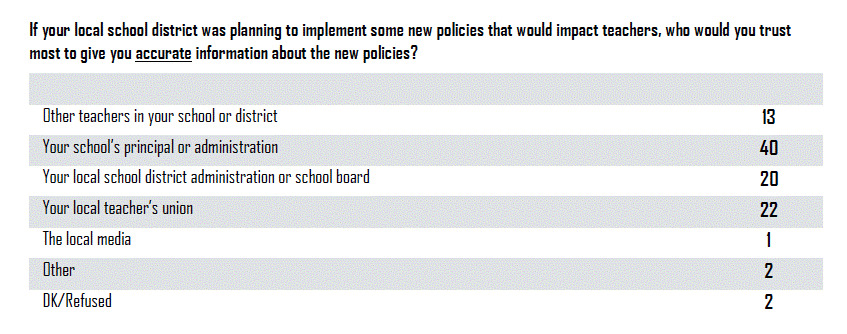-
Lesson 3: Involve Principals from the Start
For the same reason that engaging teachers early and often is essential, so is engaging principals. They also are directly affected and have a lot at stake.
"We're paying more attention to principals and providing more care and feeding and support. They're overwhelmed. They have the same accountability but less power — now responsible for only 35 percent of a teacher's evaluation, not 100 percent."
— Stephen Hegarty (Hillsborough County Public Schools)Plus, research by The Winston Group shows that teachers consider principals by far the most trusted source for credible information on these issues. Source: The Winston Group, Summer 2010
Source: The Winston Group, Summer 2010Examples from the Field:
Hillsborough County Public Schools (FL)Of the six key lessons learned in Hillsborough County and documented in case studies, the fourth focuses on the necessity of powerful principal engagement: “Include teachers and principals in every phase of the work.”Change can be imposing, even threatening. Realizing the importance of initial support from teachers and administrators, district leaders included teachers and principals throughout the process of developing new teacher and principal evaluations. In particular, a 28-member Teacher Evaluation Committee, mainly principals and teacher representatives from the Hillsborough County Teachers Association, helped refine the changes in multiple ways, from adding peer and mentor evaluators to changing the language of the Danielson Framework for Effective Teaching.An outside review of the program concluded: “Including teachers and principals in every phase of the evaluation redesign has resulted in an evaluation that honors the realities inside classrooms, while giving teachers the feedback they need to succeed. It also helped reduce fear and skepticism toward significant and controversial change.”Memphis City SchoolsIn addition to providing principals with more personnel and other resources to accomplish the teacher evaluation process, Memphis also is looking at new ways to grow and develop its principals into more effective instructional leaders. While there is consensus that teachers are the single most important school-based factor affecting student achievement, the best teachers demand strong leadership. The Leadership Effectiveness Initiative runs parallel to the Teacher Effectiveness Initiative and serves to reinforce the spirit of team: We are all in this together working hard to perform at a higher level.Pittsburgh Public SchoolsUnder the leadership of former superintendent Mark Roosevelt, principal effectiveness was an early reform priority. The Pittsburgh Urban Leadership System for Excellence (PULSE) addressed several issues: induction; evaluation; support; ongoing professional development; and an emerging leadership academy, which was established in 2007. As the home page of the website said: “Scratch the surface of an excellent school and you are likely to find an excellent principal. Look into a failing school and you will find weak leadership.” Communications Coordinator Susan Chersky reflected, “The principal work was the foundation that allowed us to move on to the effective teaching initiatives. They were the pathfinders.”



